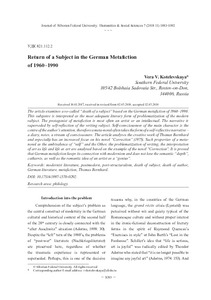Return of a Subject in the German Metafiction of 1960–1990
Скачать файл:
URI (для ссылок/цитирований):
https://elib.sfu-kras.ru/handle/2311/71762Автор:
Kotelevskaya, Vera V.
Котелевская, В.В.
Дата:
2018-07Журнал:
Журнал Сибирского федерального университета. Гуманитарные науки. Journal of Siberian Federal University. Humanities & Social Sciences;2018 11 (7)Аннотация:
The article examines a so-called “death of a subject” based on the German metafiction of 1960–1990. This subgenre is interpreted as the most adequate literary form of problematization of the modern subject. The protagonist of metafiction is most often an artist or an intellectual. The narrative is superseded by self-reflection of the writing subject. Self-consciousness of the main character is the centre of the author’s attention, therefore a meta-novel often takes the form of a self-reflective narrative – a diary, notes, a stream of consciousness. The article analyses the creative work of Thomas Bernhard and especially has an increased focus on his novel “Correction” (1975). Such properties of a meta-novel as the ambivalence of “self” and the Other, the problematization of writing, the interpretation of art as life and life as art are analysed based on the example of the novel “Correction”. It is proved that German metafiction keeps its connection with modernism and does not lose the semantic “depth”, catharsis, as well as the romantic idea of an artist as a “genius” В статье рассматривается проект «смерти субъекта» на материале немецкоязычного метаромана 1960–1990 гг. Данный романный субжанр трактуется как наиболее адекватная литературная форма проблематизации модернистского субъекта. Героем метаромана чаще всего
выступает художник или интеллектуал. Повествование вытесняется саморефлексией субъекта письма. Самосознание героя служит центром авторского внимания, поэтому метароман
часто принимает форму саморефлексивного повествования – дневника, заметок, потока сознания. Анализируется творчество Томаса Бернхарда, объектом «пристального прочтения»
является его роман «Корректура» (1975). На примере романа «Корректура» анализируются
такие свойства метаромана, как амбивалентность «я» и Другого, проблематизация письма, трактовка искусства как жизни и жизни как искусства. Доказывается, что немецкоязычный
метароман сохраняет свою связь с модернизмом и не утрачивает семантической «глубины»,
катарсиса, а также романтического представления о художнике как «гении».

